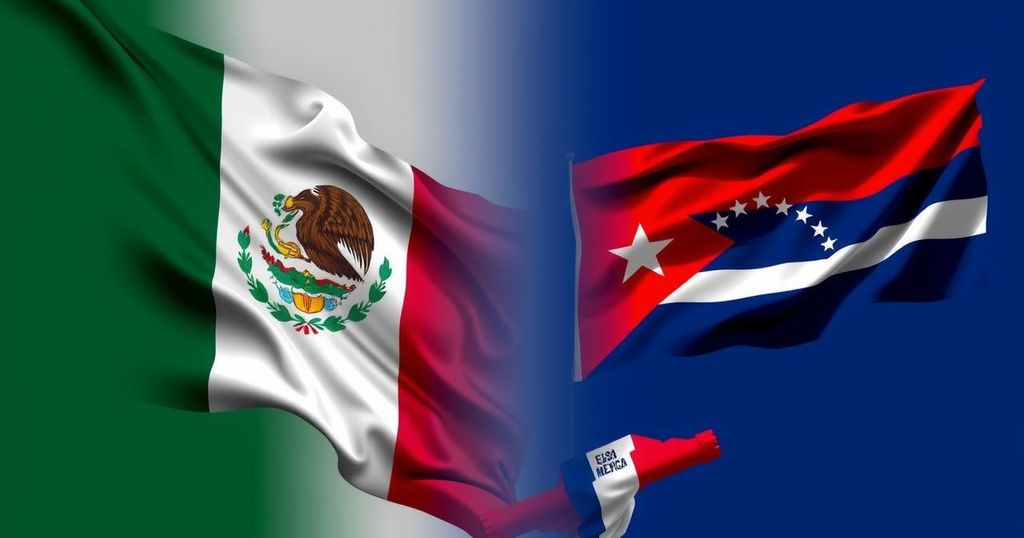Mexico has become a significant supporter of Cuba’s dictatorship, stepping in as a key ally after Venezuela’s decline. Under President Claudia Sheinbaum, Mexico has pledged substantial quantities of oil to Cuba, raising ethical concerns regarding its support for a regime characterized by oppression and a lack of democratic values. This realignment poses risks not only for Cuba’s populace but also for the democratic foundations within Mexico.
The recent actions of Mexico have generated serious concern as the nation has begun to align itself with historically repressive regimes, notably siding with Russia and Venezuela in offering support to Cuba’s longstanding dictatorship. Over the decades, Cuba has relied heavily on external support to sustain its communist regime, initially from the Soviet Union and later from Venezuela. In particular, the Soviet Union contributed over $29 billion in various forms, while Venezuela provided $35 billion primarily in oil, effectively serving as Cuba’s lifeline during challenging economic periods. Currently, with Venezuela facing its own dire circumstances, Mexico has emerged as an essential source of aid for Cuba, supplying food and oil despite the ongoing decay of the Cuban economy that remains unresponsive to such external support. Mexico’s involvement has raised eyebrows, especially since it employs questionable diplomatic maneuvers to leverage support for Cuba; for instance, in 2023, Mexico’s government indicated it would only engage with the U.S. on a migration crisis if Washington agreed to open dialogues with Cuba. President Claudia Sheinbaum has positioned her administration as a vital ally for the Cuban regime, affirming a substantial commitment of oil supplies, which included a record guarantee of 5.4 million barrels. This substantial aid takes place amidst rampant violence and instability within Mexico, where challenges such as car bombings and severe crime waves persist. Still, the Mexican government appears more focused on maintaining solidarity with Cuba rather than addressing domestic issues. In practical terms, Mexico’s current approach includes supplying approximately 13,000 barrels of oil daily to Cuba, thus surpassing the contributions from both Russia and Venezuela. This increasing support raises ethical questions about the priorities of Mexico’s government, especially in light of Cuba’s oppressive practices, including the jailing of political prisoners and the absence of democratic elections. It is salient to note that the ongoing tribulations of the Cuban populace are relegated to the background amid Mexico’s steadfast support for a regime that exemplifies political repression and economic mismanagement. This scenario starkly contrasts with the potential for genuine solidarity, which would involve advocating for political reforms and the liberation of imprisoned activists.
The support for Cuba stems from a long history of reliance on external assistance to sustain its communist system. From the Soviet Union’s significant financial support during the Cold War to Venezuela’s later assistance predominantly through oil exports, Cuba has exhibited a pattern of dependency on foreign nations to compensate for its failing economic policies and governance. Mexico’s recent actions signify a shift in alliances, as the country, traditionally viewed as a U.S. trading partner, has now taken on a role that many perceive as contradictory to democratic ideals.
In conclusion, Mexico’s actions in supporting Cuba’s dictatorship reflect a troubling alignment with oppressive regimes. While proclaiming solidarity, Mexico’s government neglects its responsibilities to its citizens and compromises its democratic values. Such support not only enables Cuba’s political repression but also jeopardizes the sustained democratic integrity within Mexico itself. Additionally, the absence of conditional support aimed at ensuring fundamental human rights in Cuba casts serious doubts on the motives behind Mexico’s diplomatic gestures.
Original Source: thehill.com






